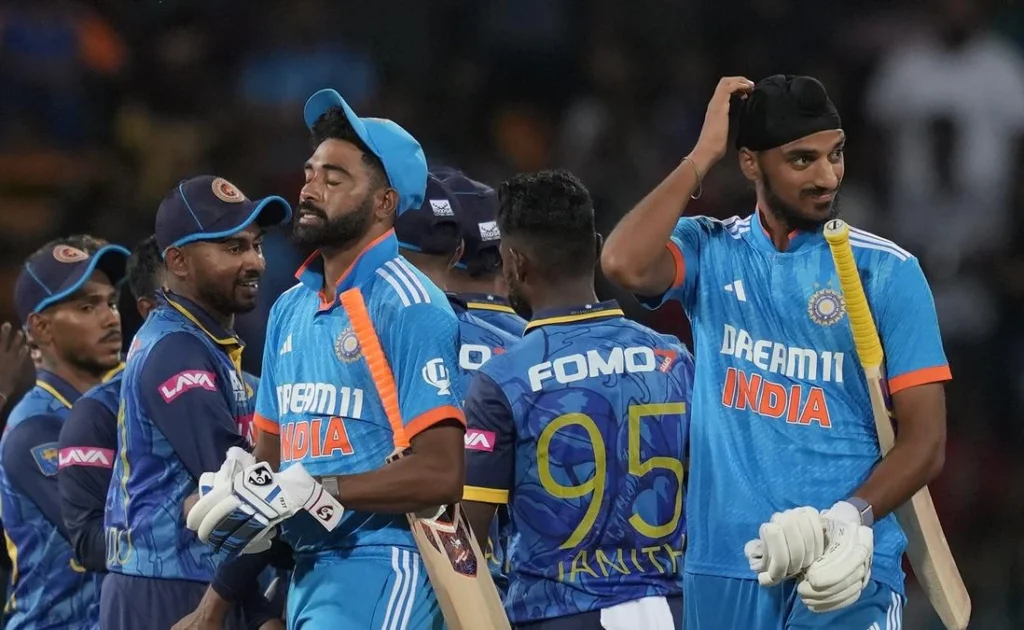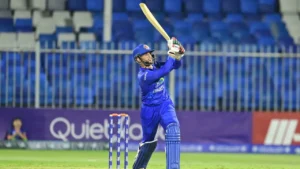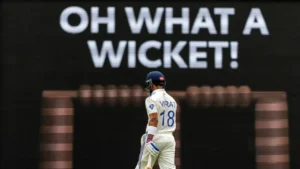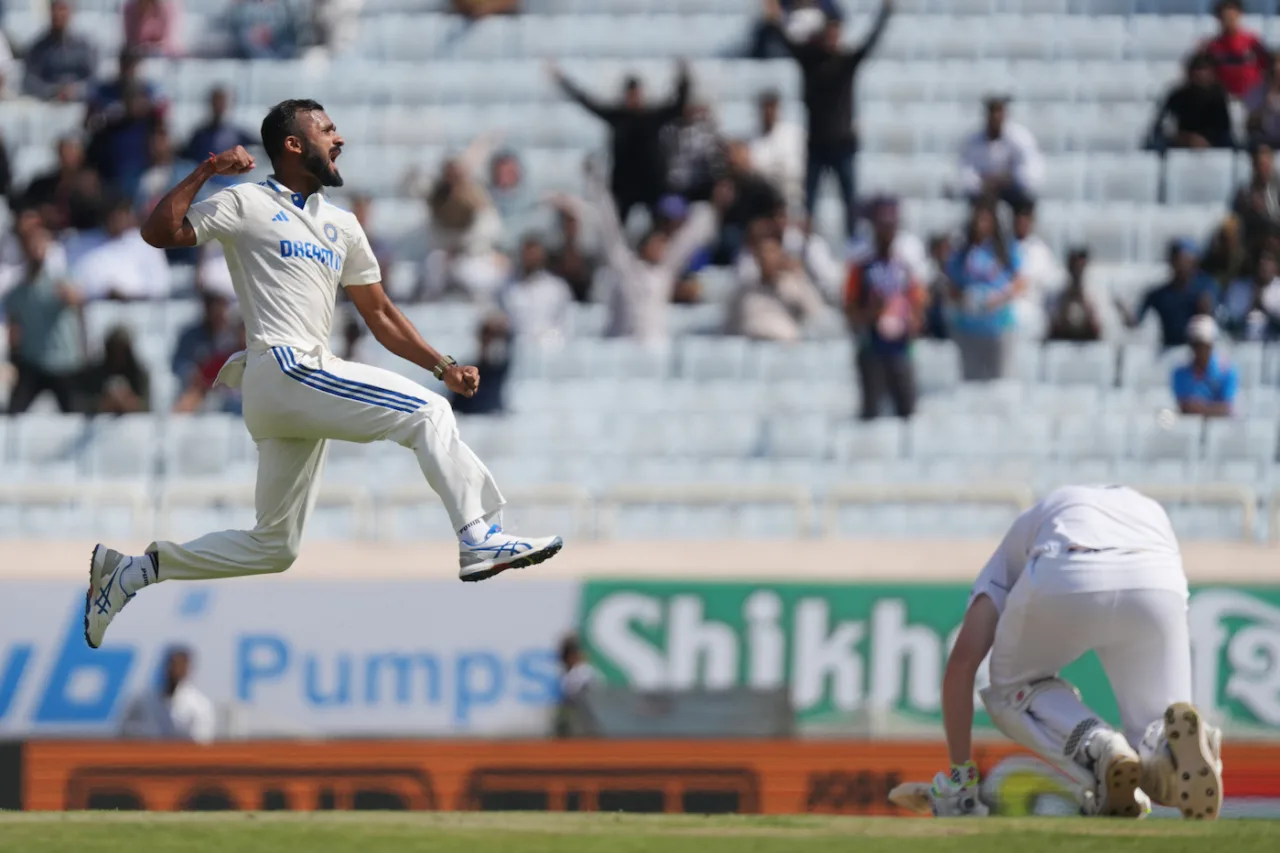The Super Over Controversy that erupted following the tied ODI between Sri Lanka and India has become a significant talking point in the cricketing world. The match, which ended in a dramatic tie, should have led to a Super Over as per the International Cricket Council’s (ICC) regulations.
However, a critical oversight by the match officials left fans and players alike questioning the decision, sparking widespread debate and scrutiny.
What is the Super Over Controversy?
The Super Over Controversy stems from the first ODI of the Sri Lanka vs India series, where both teams ended up with identical scores of 231 runs. Under the ICC’s playing conditions, introduced in December 2023, a Super Over must be conducted in the event of a tie, provided time and conditions allow.
The rule was missed by the umpires Joel Wilson, Raveendra Wimalasiri, Ranjan Madugalle, Paul Reiffel, and Ruchira Palliyaguruge, causing a lot of criticism.
How Did the Super Over Controversy Unfold?
As the game ended in a tie, everyone hoped for a Super Over to decide the winner. However, to the surprise of many, the match officials signaled the end of the game without initiating the Super Over.
The players from both teams, seemingly unaware of the necessity for a Super Over, shook hands and accepted the tie as the final result. This decision quickly led to an outcry, particularly on social media platforms, where fans and cricket analysts were vocal in their confusion and disappointment, thus giving rise to the Super Over Controversy.
The ICC’s Role and the Super Over Controversy
The ICC’s playing conditions are quite explicit when it comes to handling tied ODIs. The specific rule states:
“If the teams’ scores are equal after both innings have been completed, then a Super Over shall be played. If the Super Over is a tie, then unless exceptional circumstances arise, subsequent Super Overs shall be played until there is a winner.”
This rule is designed to ensure a definitive result in ODIs, enhancing the excitement for fans and providing a clear conclusion to the match. However, during this particular game, the rule was not enforced, leading to what is now widely recognized as the Super Over Controversy.
Internal Acknowledgment of the Super Over Controversy
In the aftermath of the match, the officials involved, including Madugalle, Wilson, and Wimalasiri, reportedly had internal discussions where they acknowledged their mistake. They admitted to misinterpreting the ICC’s playing conditions, which resulted in the Super Over Controversy.
It was later clarified that if another tie occurred in the remaining matches of the series, the Super Over would indeed be conducted to avoid a repeat of this controversy.
The Broader Impact of the Super Over Controversy
The Super Over Controversy did not just impact the immediate match but also had broader implications for the series and the perception of the officials involved. Despite the controversy, the series continued, with Sri Lanka ultimately winning the three-match series 2-0.
However, the first ODI’s unresolved nature due to the missing Super Over left many feeling that the game had been incomplete. Fans and analysts argued that the excitement and drama of a Super Over were crucial elements that were unfairly missed due to the officials’ oversight.
Lessons from the Super Over Controversy
The Super Over Controversy serves as a stark reminder of the importance of strict adherence to established rules and protocols in international cricket. It highlights the need for match officials to be thoroughly familiar with the playing conditions and to apply them accurately during games.
This incident also underscores the importance of communication and awareness among players and officials alike, ensuring that such errors do not occur in future matches.
Furthermore, the controversy has sparked discussions about whether additional training or resources are needed for match officials to prevent similar situations.
The potential for human error is always present, but the stakes in international cricket are high, and the consequences of such oversights can be significant, as seen in this case.
The Future of Super Overs in Cricket
In the wake of the Super Over Controversy, there have been calls within the cricket community to review and perhaps even strengthen the regulations surrounding Super Overs.
Some have suggested that clearer communication protocols should be established to ensure that all parties involved—the players, officials, and broadcasters—are on the same page regarding the match’s outcome and the procedures that follow a tie.
The excitement generated by a Super Over is unparalleled, and it adds a thrilling climax to what might otherwise be an inconclusive finish.
As cricket continues to evolve, the importance of delivering a fair and exciting experience for fans cannot be overstated. Ensuring that Super Overs are conducted when required is a vital part of that commitment.
Summary: The Impact of the Super Over Controversy
The Super Over Controversy in the Sri Lanka vs India ODI will be remembered as a critical moment in cricket history, where a simple oversight led to significant debate and dissatisfaction. It has emphasized the need for vigilance, accuracy, and clarity in applying cricket’s rules.
As the cricketing world moves forward, the lessons learned from this incident will hopefully prevent similar controversies from arising in the future, ensuring that the integrity of the game is upheld and that the excitement of cricket remains undiminished.











